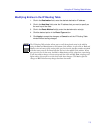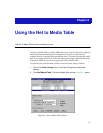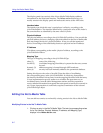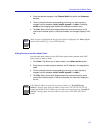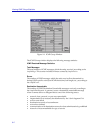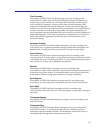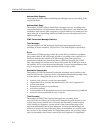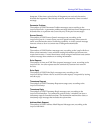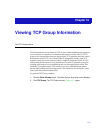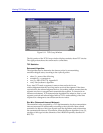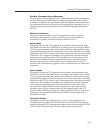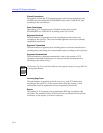
9-3
Viewing ICMP Group Statistics
Time Exceeded
The number of ICMP Time Exceeded messages received, according to the
icmpInTimeExcds. When a device discards a datagram because the time-to-live
counter (hop count) reached zero, or because the reassembly counter expired
while waiting for fragments, a router sends a time exceeded message to the
station that transmitted the original datagram. A time exceeded message can
indicate an excessively long route from source to destination, or it could indicate a
circular route due to errors in the routing tables. For fragmented packets, the
receiving station starts its reassembly timer when it receives the first fragment of a
fragmented datagram. If the timer expires before all fragments are received, the
station discards the fragments it has already received, and transmits a time
exceeded message.
Parameter Problem
The number of ICMP Parameter Problem messages received, according to the
icmpInParmProbs. A parameter problem message indicates that a datagram was
discarded due to a problem not covered by any of the previous messages.
Source Quench
The number of ICMP Source Quench messages received, according to the
icmpInSrcQuenchs. A router issues a source quench message when network traffic
overwhelms the router’s buffering capability. A source quench message instructs
a host to slow its current rate of datagram transmission.
Redirect
The number of ICMP Redirect messages received, according to the
icmpInRedirects. When a host transmits, it uses minimal routing information and it
learns new routes from routers. A router that detects a host using an inefficient
route sends a redirect message that contains new routing information.
Echo Request
The number of ICMP Echo (request) messages received, according to the
icmpInEchos. An echo request tests connectivity between two network devices.
Echo Reply
The number of ICMP Echo Reply messages received, according to the
icmpInEchoReps. When a device receives an echo request, it responds by issuing an
echo reply.
Timestamp Request
The number of ICMP Timestamp Request messages received, according to the
icmpInTimeStamps.
Timestamp Reply
The number of ICMP Timestamp Reply messages received, according to the
icmpInTimeStampReps. To synchronize system clocks, a machine can issue a
timestamp request to another machine. The destination machine then issues a
timestamp reply message that includes the system time.



